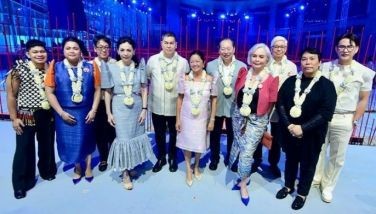Never again

I’m sure that the last thing President Marcos wants to happen is for monopolies and cartels to thrive under his watch.
After all, his late father’s administration was marred by controversies involving state monopoly as well as control by so-called cronies over two of the country’s largest export industries at that time – sugar and coconuts.
More recently, Sen. Risa Hontiveros has been raising concerns about the relentless surge in sugar prices, despite claims of a stable supply from the ongoing importation.
What exacerbates the situation, according to her, is the government’s decision to favor only three companies to import sugar, triggering alarm bells and fueling speculation that history is repeating itself and that cronyism is creeping back into the administration of PBBM.
According to Hontiveros, the problem is not a sugar shortage, but the fact that three traders have cornered the buying and selling of imported sugar.
Acting Sugar Regulatory Administration (SRA) administrator Pablo Azcona had reported that before April 1 this year, 179,000 metric tons of sugar had already arrived in the country, with 86,000 MT made available for domestic consumption. Despite this, sugar prices remain high.
Hontiveros said that these continued high prices, despite stable supply, exhibit traits of a monopoly behavior and suggest the presence of a hidden cartel.
We do not want uncontrolled importation of sugar because this would mean the death of the domestic sugar industry.
But at the least, PBBM should allow more entities such as industrial users and food manufacturers to import sugar directly in order to prevent prices of many products that use sugar from rising.
Hontiveros, however, maintains that importation should only be done as a last resort and that revenues earned by government from sugar imports be earmarked for the growth and development of the local sugar industry.
The push for waste-to-energy
The Philippines is undoubtedly one of the largest generators of solid waste in Southeast Asia. And with the power crisis the country is experiencing, converting some of these wastes into energy makes a lot of sense.
Unfortunately, existing laws and policies have conflicting views about the idea of waste-to-energy technology (WTE), with mainly calls for burning waste to generate electricity.
For instance, Republic Act 8749 or the Clean Air Act prohibits incineration for treating municipal, bio-medical, and hazardous wastes due to toxic and poisonous emissions and fumes that can be produced.
The DENR has clarified, however, that the said law prohibits only burning processes which emit poisonous and toxic fumes. It said that any thermal treatment technology, whether burn or not burn, that meets the emission standards is allowed to operate in the country. The standards are, however, very stringent and the DENR has admitted that it has insufficient capabilities to monitor emission from municipal solid waste incineration.
RA 9003 or the Ecological Solid Waste Management Act on the other hand mandates the use of landfills for waste disposal.
Meanwhile, the House of Representatives already approved a bill seeking to allow the use of WTE technology, including incineration, so long as it does not produce hazardous fumes amending RA 8749 to allow the use of incineration for WTE purposes.
Then there’s the Renewable Energy Act which includes biodegradable organic fractions of industrial and municipal wastes as biomass resources that can be used by biomass energy systems to produce energy although the Department of Energy has identified solar and wind as priority renewable energy power sources.
The only clear thing about the push for waste-to-energy as an alternative to fossil fuels is the lack of clarity in policies.
Waste-to-energy is not cheap. Facilities that would turn heat from burning waste into energy would require substantial capital and technical expertise. Public-private partnerships would be the ideal route to take.
Waste-to-energy facilities would require higher tipping fees that would be charged against waste generators, including local governments. But who would end up bearing the added costs? Without government funding and incentives, consumers would have to pay for these.
As waste-to-energy facilities need wastes, they would need more and more trash to ramp up production of energy. Importing wastes should be out of the question.
In our search for clean and reliable sources of energy, let’s not simply jump out of the frying fan and into the fire.
Promoting fintech
Securities and Exchange Commission (SEC) commissioner Kelvin Lester Lee recently bagged two international awards for leading the country’s business sector into pursuing new innovations in financial technology or fintech.
Lee was named a Gold Stevie winner for Thought Leader of the Year in the 10th annual Asia-Pacific Stevie Awards, which recognizes innovation in the workplace in the 29 nations of the AsPac region.
He was also recognized as outstanding Fintech Regulatory and Innovation Leader in the Philippines by the Asian Fintech Academy during the Asian Digital Finance Forum and Awards last March.
Lee has been instrumental in spearheading groundbreaking initiatives within the realm of fintech. He also crafted the SEC’s “delicate balancing act” policy which enables the SEC to foster an environment conducive to fintech growth while upholding its responsibility as a financial regulator to safeguard the interests of investors.
He was largely responsible for the establishment of the SEC PhiliFintech Innovation Office or PhiliFINNO which serves as the SEC’s primary office for fintech regulation and policy formulation as it seeks to promote an innovative culture in the corporate sector while reducing the gaps in consumer and investor protection.
Last December, Lee was also honored as one of the Philippine blockchain champions by the BlockChain Council of the Philippines for his contributions in driving the adoption of blockchain and Web3 technologies in the Philippines.
Last January, he solidified a partnership with the UP Law Center to pave the way for joint research and capacity-building projects focused on digital assets, blockchain, non-fungible tokens, and decentralized finance.
For comments, e-mail at [email protected].
- Latest
- Trending





























